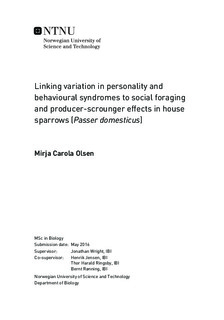Linking variation in personality and behavioural syndromes to social foraging and producer-scrounger effects in house sparrows (Passer domesticus)
Master thesis
Permanent lenke
http://hdl.handle.net/11250/2392920Utgivelsesdato
2016Metadata
Vis full innførselSamlinger
- Institutt for biologi [2571]
Sammendrag
Consistent behavioural differences between individuals across time and situations are referred to as animal personality. Associated with this are behavioural syndromes , which are suites of correlated behaviours across individuals. When foraging in social groups, individuals can use a producer tactic, which involves searching for food independently, or a scrounger tactic, which involves joining others who have already discovered food. In this study, wild populations of house sparrows (Passer domesticus) were tested in captive communal behavioural assays, trying to link variation in personality and behavioural syndromes to social foraging and producer-scrounger tactics in 8 social flocks. Individual variation and the covariation between the measured behavioural variables was quantified using univariate tests and structural equation modelling (SEM), respectively. There were surprisingly few sex differences in behaviour in these flocks. Nevertheless, clusters of covariance around individual differences in both activity (coming and going from the feeder in groups) and joining behaviour (rates of scrounging and aggression at the feeder) provided the best model for the individual variation in different behaviours in these sparrow flocks. However, we found little individual consistency in the behavioural traits tested, indicating that there are no personalities, and thus only plasticity, in social foraging behaviours in these house sparrows. The findings here suggests that the birds were acting as a group of almost interchangeable individuals, and that the patterns of social foraging recorded were not driven by individual-specific producer-scrounger tactics or a wider behavioural syndrome.
